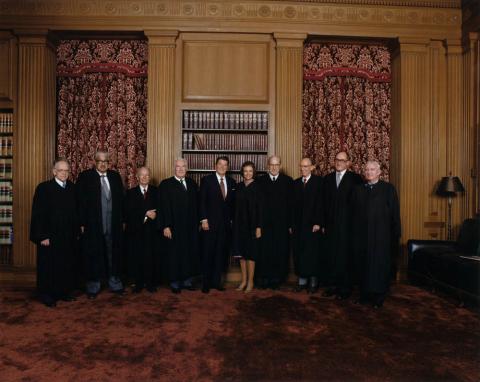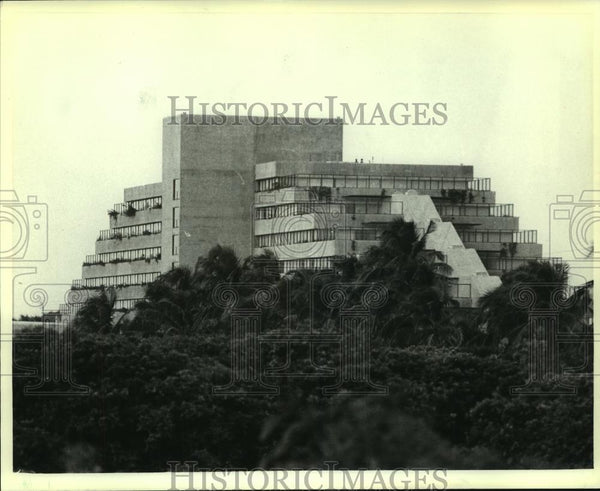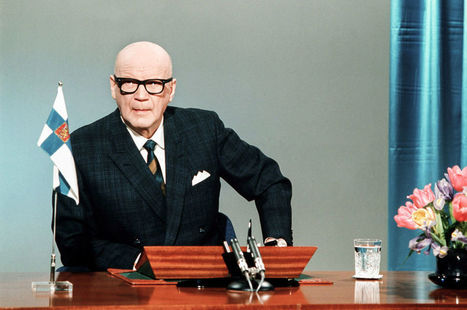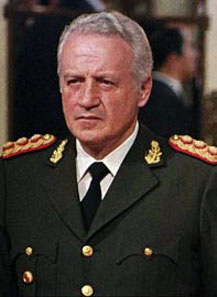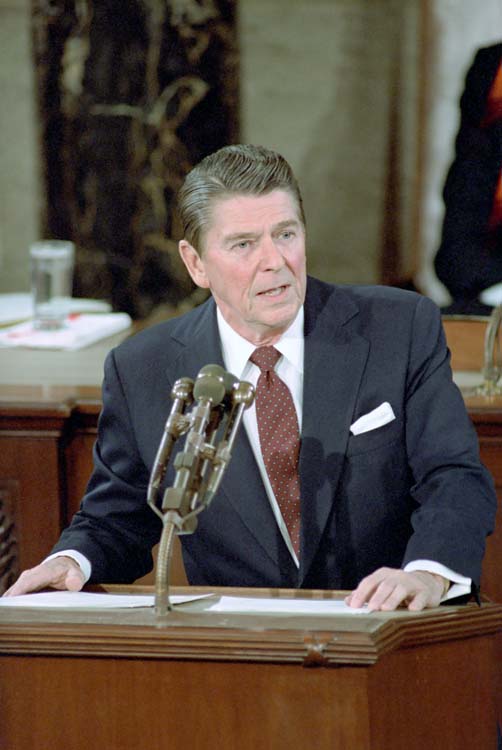Chapter 12: National and International Headlines (Fall 1981: Part I)
Sergeant Foley
Well-known member
PATCO GOES ON STRIKE; PRESIDENT REAGAN DEMANDS AIR STRIKERS GET BACK TO WORK OR GET FIRED
*Monday, August 3, 1981: The Professional Air Traffic Controller Organization went on strike at 7:00 AM EST. The demands of the Air Traffic Controllers Union was for each employee to have annual wage increase of $10,000; 32-hour workweek and increased benefits. Citing the law prohibiting federal government employees from striking, President Ronald Reagan ordered the walkouts to return back to their jobs within 48 hours or risk losing their jobs.
GARCIA MEZA FORCED TO RESIGN AS BOLIVIAN PRESIDENT FOLLOWING REBELLION IN SANTA CRUZ
*Tuesday, August 4, 1981: Following a full-scale rebellion in Santa Cruz the previous day before, embattled Bolivian President General Luis Garcia Meza was replaced by the Military Junta, which was led by General Celso Torrelio.
REAGAN ORDERS THE FIRING OF 11,359 AIR TRAFFIC CONTROLLERS, WHO IGNORED THE PRESIDENT'S 48-HOUR DEADLINE
 *Wednesday, August 5, 1981: Following through on his threats, President Reagan ordered the firing of 11,359 Air Traffic Controllers, who defied the 11:00 AM deadline to get back to work. Another 875 who walked out, chose to return before getting fired themselves.
*Wednesday, August 5, 1981: Following through on his threats, President Reagan ordered the firing of 11,359 Air Traffic Controllers, who defied the 11:00 AM deadline to get back to work. Another 875 who walked out, chose to return before getting fired themselves.
ROCKET EXPLODES DURING TEST-RUN
*The 55-foot tall Percheron rocket, which was privately built by the Space Services Inc., exploded on the launching pad at Matagora Island in Texas.
REAGAN GREEN-LIGHTS PRODUCTION OF NEUTRON BOMB
*Thursday, August 6, 1981: President Reagan gives the green-light for American production of the neutron bomb, which also will be including warheads for 380 Lance missiles and 800 on 150-mm howitzers for American military personnel troops, who are stationed in Europe.
STATE RADIO ENDS IN THE FRENCH REPUBLIC
*French Communications Minister Georges Fillioud announced the ending of state radio monopolies in the French Republic and permitted privately-owned stations for the first time in the country's history. Within two months, 400 new stations were on the air.
FINAL EDITION OF WASHINGTON STAR IS PUBLISHED; ENDS 128 YEARS OF PUBLICATION
*Friday, August 7, 1981: The Washington Star published their last edition with the headline reading "128 Years of Service Ending" and it also included a letter from President Reagan, which noted the following: "There is a great silence today in Washington." The paper sold 640,000 copies, doubling their normal circulation and the largest run in the newspaper's history.
NATIONAL AQUARIUM OPENS IN BALTIMORE
*Saturday, August 8, 1981: The National Aquarium in Baltimore, Maryland opens after three years of construction and development, becoming one of the Old Line State's most popular attractions and spurring the development of other city aquariums.
FIVE ALLEGED COUP PLOTTERS EXECUTED IN LIBERIA
*Monday, August 10, 1981: Liberian President Master Sergeant Samuel K. Doe, who took power in a bloody coup d'etat in 1980 which resulted in the violent death of then-Liberian President William R. Tolbert on 12 April 1980, accused five members of the People's Redemption Council of plotting to assassinate him. Vice President Thomas Weh-Syn including council members Harris Johnson, Nelson Toe, Robert Sumo and Henry Zuo, who were part of Doe's group of 17 military officers and soldiers in the 1980 coup. During the next few days, the accused were given a military trial and executed.
BRISCOE ENDORSING WHITE FOR GOVERNOR
 *Tuesday, August 11, 1981: Former Texas Governor Dolph Briscoe (D), who had served as Texas' 41st Governor from 16 January 1973 to 16 January 1979, announced he was endorsing his young protege, United States Senator Mark W. White, Jr., (D-TX) in the Democratic Party gubernatorial primary for Governor of Texas in 1982. Briscoe said during an interview with CBS 5 KENS-TV San Antonio "I believe that Senator White is the right person for the job. Serving as Assistant Attorney General, Texas Secretary of State and currently as United States Senator and with the experience of serving in state and federal government, I am confident that Texans will choose Senator White as the 43rd Governor of the State of Texas next year because it's very important that Texans want change and Mark will lead the way going forward."
*Tuesday, August 11, 1981: Former Texas Governor Dolph Briscoe (D), who had served as Texas' 41st Governor from 16 January 1973 to 16 January 1979, announced he was endorsing his young protege, United States Senator Mark W. White, Jr., (D-TX) in the Democratic Party gubernatorial primary for Governor of Texas in 1982. Briscoe said during an interview with CBS 5 KENS-TV San Antonio "I believe that Senator White is the right person for the job. Serving as Assistant Attorney General, Texas Secretary of State and currently as United States Senator and with the experience of serving in state and federal government, I am confident that Texans will choose Senator White as the 43rd Governor of the State of Texas next year because it's very important that Texans want change and Mark will lead the way going forward."
There's growing speculation that if White wins the Governorship next fall, Briscoe could get appointed to White's US Senate seat.
IBM-PC INTRODUCED
*Wednesday, August 12, 1981: The IBM-Personal Computer was formally introduced during a press conference at the Waldorf-Astoria Hotel in New York City, New York State. It was also included with MS-DOS software owned by Microsoft, Inc.,
REAGAN SIGNS ECONOMIC RECOVERY TAX ACT OF 1981 INTO LAW
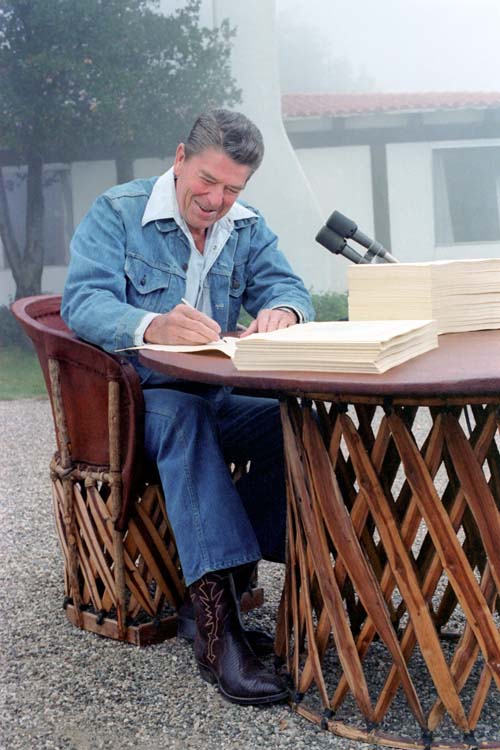 *Thursday, August 13, 1981: President Reagan signed the Economic Recovery Tax Act of 1981 and the Omnibus Budget Reconciliation Act HR 3982 into law, which is the largest 25% income tax cut for which he had sought passage. He signed both economic bills at the Rancho de Cielo Ranch in Santa Barbara, California; The Democratic-controlled US House of Representatives voted 240-195 (due to strong support from conservative Southern Democrats) and the Republican-controlled United States Senate voted in approval 91-11 in July 1981. Reporters and political analysts called the President's success in passing major tax bills and cutting the federal budget a success. According to one columnist, "Reagan's legislative success had represented the most formidable domestic initiative any previous President had driven through since the first 100 days of the Presidency of the late Franklin Delano Roosevelt."
*Thursday, August 13, 1981: President Reagan signed the Economic Recovery Tax Act of 1981 and the Omnibus Budget Reconciliation Act HR 3982 into law, which is the largest 25% income tax cut for which he had sought passage. He signed both economic bills at the Rancho de Cielo Ranch in Santa Barbara, California; The Democratic-controlled US House of Representatives voted 240-195 (due to strong support from conservative Southern Democrats) and the Republican-controlled United States Senate voted in approval 91-11 in July 1981. Reporters and political analysts called the President's success in passing major tax bills and cutting the federal budget a success. According to one columnist, "Reagan's legislative success had represented the most formidable domestic initiative any previous President had driven through since the first 100 days of the Presidency of the late Franklin Delano Roosevelt."
BREAKING NEWS ALERT: UNITED STATES SENATOR L. DOUGLAS WILDER (D-VA) ANNOUNCING HE WILL NOT SEEK REELECTION IN 1982
*Friday, August 14, 1981: In what many political analysts and news columnists considered one of the most shocking political bombshells ever, United States Senator L. Douglas Wilder (D-VA) announced during a press conference in Richmond, Virginia that he wasn't going to be seeking reelection to his US Senate seat in 1982. "Despite 12 years of serving the Commonwealth of Virginia that included six years in the Virginia State Senate representing Districts 9 and 30 including the past five years representing Virginians in the United States Senate, I have decided that I could better my duty in public service than avoiding vicious hyper partisanship that has begun to wreck our national politics in the past few years, and I have concluded that I won't be seeking reelection to another six years as your United States Senator. I will continue to keep fighting for Virginians in the next 16 months working to creating more jobs, fighting on behalf of the common Americans who don't have their voices heard on Capitol Hill and the like." There's no word on whom the Virginia Democratic Party will recruit to run to keep Wilder's US Senate seat in Democratic hands, but the National Republican Senate Campaign Committee announced they're going to be targeting Virginia in 1982 and already announcing his candidacy was US Rep. Paul Trible (R-VA 01), who has the endorsement of both President Reagan and outgoing Virginia Governor John N. Dalton (R) including United States Senator John Warner (R-VA).
*Monday, August 3, 1981: The Professional Air Traffic Controller Organization went on strike at 7:00 AM EST. The demands of the Air Traffic Controllers Union was for each employee to have annual wage increase of $10,000; 32-hour workweek and increased benefits. Citing the law prohibiting federal government employees from striking, President Ronald Reagan ordered the walkouts to return back to their jobs within 48 hours or risk losing their jobs.
GARCIA MEZA FORCED TO RESIGN AS BOLIVIAN PRESIDENT FOLLOWING REBELLION IN SANTA CRUZ
*Tuesday, August 4, 1981: Following a full-scale rebellion in Santa Cruz the previous day before, embattled Bolivian President General Luis Garcia Meza was replaced by the Military Junta, which was led by General Celso Torrelio.
REAGAN ORDERS THE FIRING OF 11,359 AIR TRAFFIC CONTROLLERS, WHO IGNORED THE PRESIDENT'S 48-HOUR DEADLINE

ROCKET EXPLODES DURING TEST-RUN
*The 55-foot tall Percheron rocket, which was privately built by the Space Services Inc., exploded on the launching pad at Matagora Island in Texas.
REAGAN GREEN-LIGHTS PRODUCTION OF NEUTRON BOMB
*Thursday, August 6, 1981: President Reagan gives the green-light for American production of the neutron bomb, which also will be including warheads for 380 Lance missiles and 800 on 150-mm howitzers for American military personnel troops, who are stationed in Europe.
STATE RADIO ENDS IN THE FRENCH REPUBLIC
*French Communications Minister Georges Fillioud announced the ending of state radio monopolies in the French Republic and permitted privately-owned stations for the first time in the country's history. Within two months, 400 new stations were on the air.
FINAL EDITION OF WASHINGTON STAR IS PUBLISHED; ENDS 128 YEARS OF PUBLICATION
*Friday, August 7, 1981: The Washington Star published their last edition with the headline reading "128 Years of Service Ending" and it also included a letter from President Reagan, which noted the following: "There is a great silence today in Washington." The paper sold 640,000 copies, doubling their normal circulation and the largest run in the newspaper's history.
NATIONAL AQUARIUM OPENS IN BALTIMORE
*Saturday, August 8, 1981: The National Aquarium in Baltimore, Maryland opens after three years of construction and development, becoming one of the Old Line State's most popular attractions and spurring the development of other city aquariums.
FIVE ALLEGED COUP PLOTTERS EXECUTED IN LIBERIA
*Monday, August 10, 1981: Liberian President Master Sergeant Samuel K. Doe, who took power in a bloody coup d'etat in 1980 which resulted in the violent death of then-Liberian President William R. Tolbert on 12 April 1980, accused five members of the People's Redemption Council of plotting to assassinate him. Vice President Thomas Weh-Syn including council members Harris Johnson, Nelson Toe, Robert Sumo and Henry Zuo, who were part of Doe's group of 17 military officers and soldiers in the 1980 coup. During the next few days, the accused were given a military trial and executed.
BRISCOE ENDORSING WHITE FOR GOVERNOR

There's growing speculation that if White wins the Governorship next fall, Briscoe could get appointed to White's US Senate seat.
IBM-PC INTRODUCED
*Wednesday, August 12, 1981: The IBM-Personal Computer was formally introduced during a press conference at the Waldorf-Astoria Hotel in New York City, New York State. It was also included with MS-DOS software owned by Microsoft, Inc.,
REAGAN SIGNS ECONOMIC RECOVERY TAX ACT OF 1981 INTO LAW

BREAKING NEWS ALERT: UNITED STATES SENATOR L. DOUGLAS WILDER (D-VA) ANNOUNCING HE WILL NOT SEEK REELECTION IN 1982
*Friday, August 14, 1981: In what many political analysts and news columnists considered one of the most shocking political bombshells ever, United States Senator L. Douglas Wilder (D-VA) announced during a press conference in Richmond, Virginia that he wasn't going to be seeking reelection to his US Senate seat in 1982. "Despite 12 years of serving the Commonwealth of Virginia that included six years in the Virginia State Senate representing Districts 9 and 30 including the past five years representing Virginians in the United States Senate, I have decided that I could better my duty in public service than avoiding vicious hyper partisanship that has begun to wreck our national politics in the past few years, and I have concluded that I won't be seeking reelection to another six years as your United States Senator. I will continue to keep fighting for Virginians in the next 16 months working to creating more jobs, fighting on behalf of the common Americans who don't have their voices heard on Capitol Hill and the like." There's no word on whom the Virginia Democratic Party will recruit to run to keep Wilder's US Senate seat in Democratic hands, but the National Republican Senate Campaign Committee announced they're going to be targeting Virginia in 1982 and already announcing his candidacy was US Rep. Paul Trible (R-VA 01), who has the endorsement of both President Reagan and outgoing Virginia Governor John N. Dalton (R) including United States Senator John Warner (R-VA).
Last edited:


